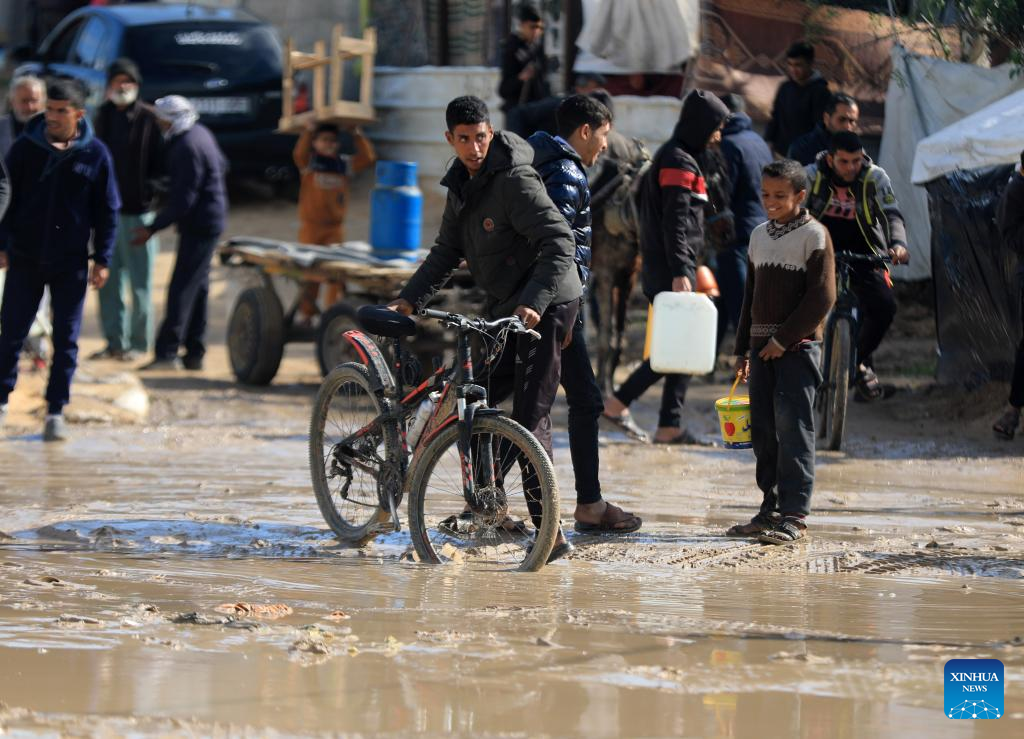
People are seen after rainfall at a temporary camp in the southern Gaza Strip city of Rafah, on Jan. 28, 2024. The United Nations Office for the Coordination of Humanitarian Affairs (OCHA) warned that tens of thousands of displaced people suffer from catastrophic conditions inside and outside shelters due to lack of food, water, shelter, medical care, and protection. "The absence of toilets increases the risk of the spread of disease," especially when rain causes floods, it warned. (Photo by Yasser Qudih/Xinhua)
GAZA, Jan. 29 (Xinhua) -- For three days, Om Mohammed Al-Attar, a 45-year-old Palestinian woman, has spent the nights moving between the corners of her tent in Rafah City in the southern Gaza Strip to remove rainwater that has infiltrated the mattresses of her five children.
"The heavy rainwater deprived my children of sleeping as all the mattresses and clothes were wet. They were forced to stay in open areas without having any cover that would protect them from the cold weather," she told Xinhua with teary eyes.
Al-Attar, who was displaced from the town of Beit Lahia in the northern Gaza Strip to Rafah City, said that her family became homeless and lived in a tent that "did not protect them from the coldness or even from Israeli bombing."
The same dire situation was experienced by Walid Hammad, who arrived in Rafah City after a displacement trip from the Jabalia refugee camp in northern Gaza with his wife and six children.
They were drowned in rainwater at night and as soon as the sun rose the next morning, Hammad inspected his tent, whose wooden poles had broken and all its contents drowned in the rainwater, which created a small lake inside.
"I do not know how long we will remain in this suffering. We escaped from death, and now we are escaping from the rain, but we were not able to escape from the diseases that afflicted us due to the freezing cold in light of the lack of daily necessities," Hammad told Xinhua.
Both Hammad and Al-Attar complain about the lack of necessities of life in the tents where tens of thousands of forced-displaced Palestinians live to escape the Israeli military operation in the besieged enclave.
The residents of the Gaza Strip, home to about 2.3 million Palestinians, have been living in difficult conditions since October 7, 2023, after Israel declared a large-scale "war" in response to Hamas launching an unexpected military attack in southern Israel, killing about 1,200 Israelis.
Since then, the Israeli army has continued to launch its air, land, and sea attacks on the Gaza Strip, killing more than 26,400 Palestinians and wounding more than 62,000 others as of Monday, most of them women and children, according to what the Hamas-run Ministry of Health in Gaza announced.
The United Nations Office for the Coordination of Humanitarian Affairs (OCHA) warned that tens of thousands of displaced people suffer from catastrophic conditions inside and outside shelters due to lack of food, water, shelter, medical care, and protection.
"The absence of toilets increases the risk of the spread of disease," especially when rain causes floods, it warned. ■
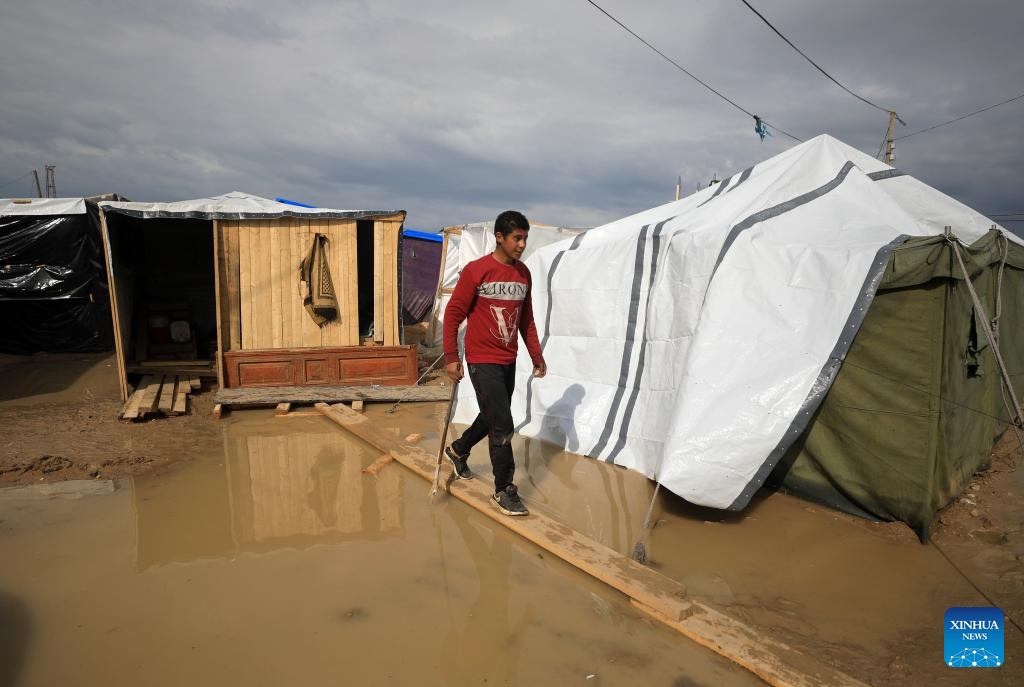
A young man walks past a tent after rainfall at a temporary camp in the southern Gaza Strip city of Rafah, on Jan. 28, 2024. The United Nations Office for the Coordination of Humanitarian Affairs (OCHA) warned that tens of thousands of displaced people suffer from catastrophic conditions inside and outside shelters due to lack of food, water, shelter, medical care, and protection. "The absence of toilets increases the risk of the spread of disease," especially when rain causes floods, it warned. (Photo by Yasser Qudih/Xinhua)
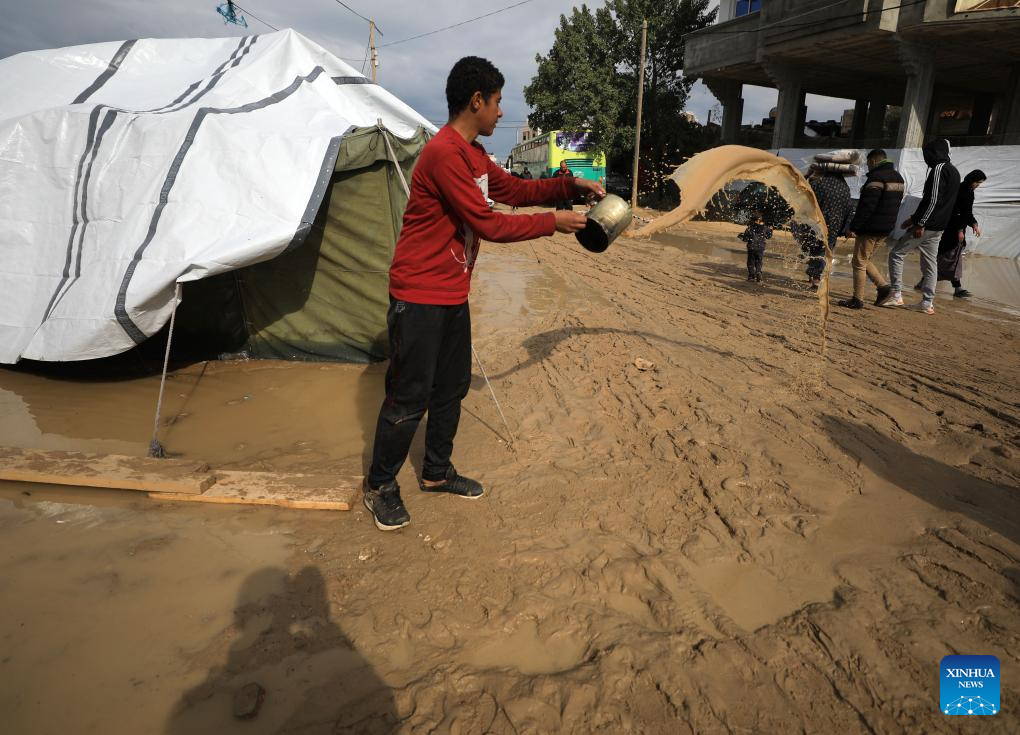
A young man removes rainwater at a temporary camp in the southern Gaza Strip city of Rafah, on Jan. 28, 2024. The United Nations Office for the Coordination of Humanitarian Affairs (OCHA) warned that tens of thousands of displaced people suffer from catastrophic conditions inside and outside shelters due to lack of food, water, shelter, medical care, and protection. "The absence of toilets increases the risk of the spread of disease," especially when rain causes floods, it warned. (Photo by Yasser Qudih/Xinhua)
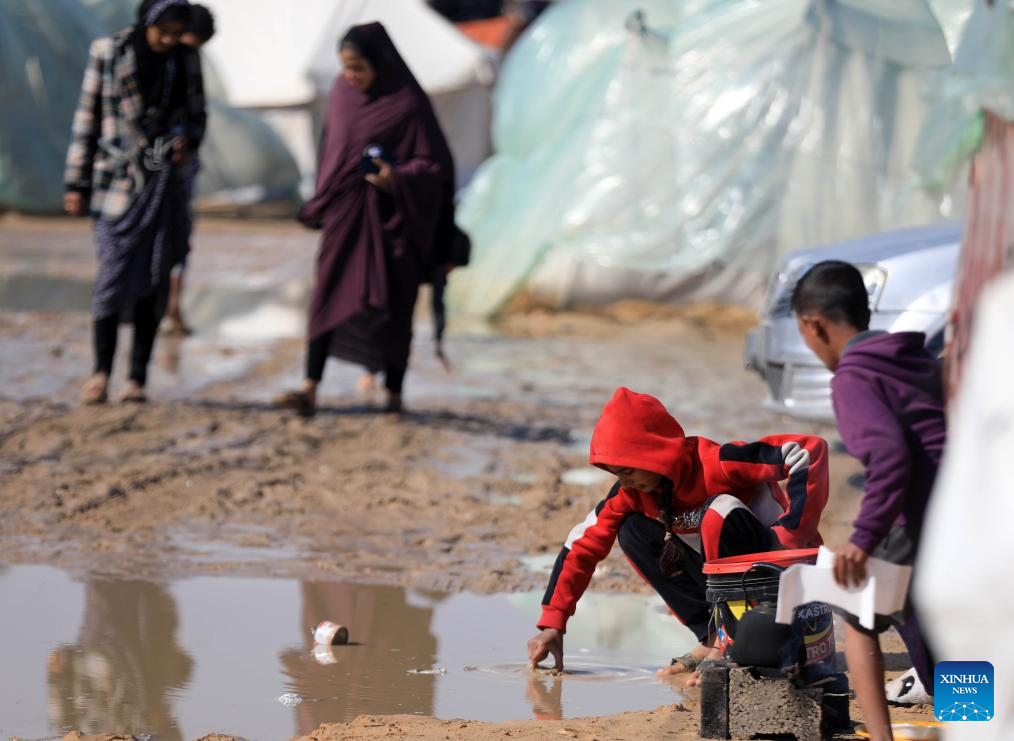
People are seen after rainfall at a temporary camp in the southern Gaza Strip city of Rafah, on Jan. 28, 2024. The United Nations Office for the Coordination of Humanitarian Affairs (OCHA) warned that tens of thousands of displaced people suffer from catastrophic conditions inside and outside shelters due to lack of food, water, shelter, medical care, and protection. "The absence of toilets increases the risk of the spread of disease," especially when rain causes floods, it warned. (Photo by Yasser Qudih/Xinhua)
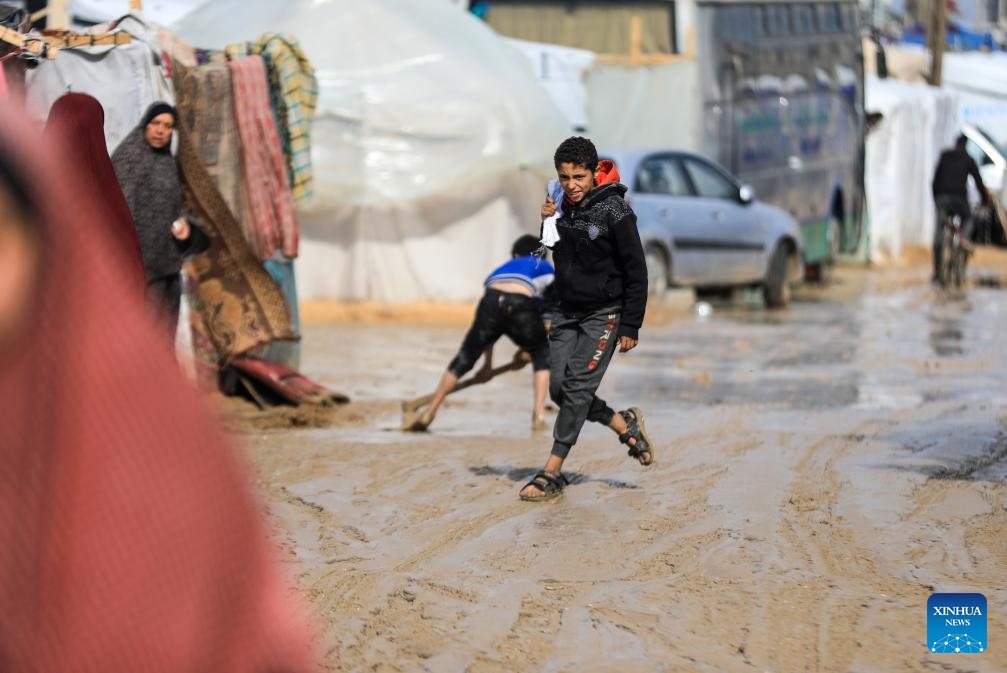
People are seen after rainfall at a temporary camp in the southern Gaza Strip city of Rafah, on Jan. 28, 2024. The United Nations Office for the Coordination of Humanitarian Affairs (OCHA) warned that tens of thousands of displaced people suffer from catastrophic conditions inside and outside shelters due to lack of food, water, shelter, medical care, and protection. "The absence of toilets increases the risk of the spread of disease," especially when rain causes floods, it warned. (Photo by Yasser Qudih/Xinhua)
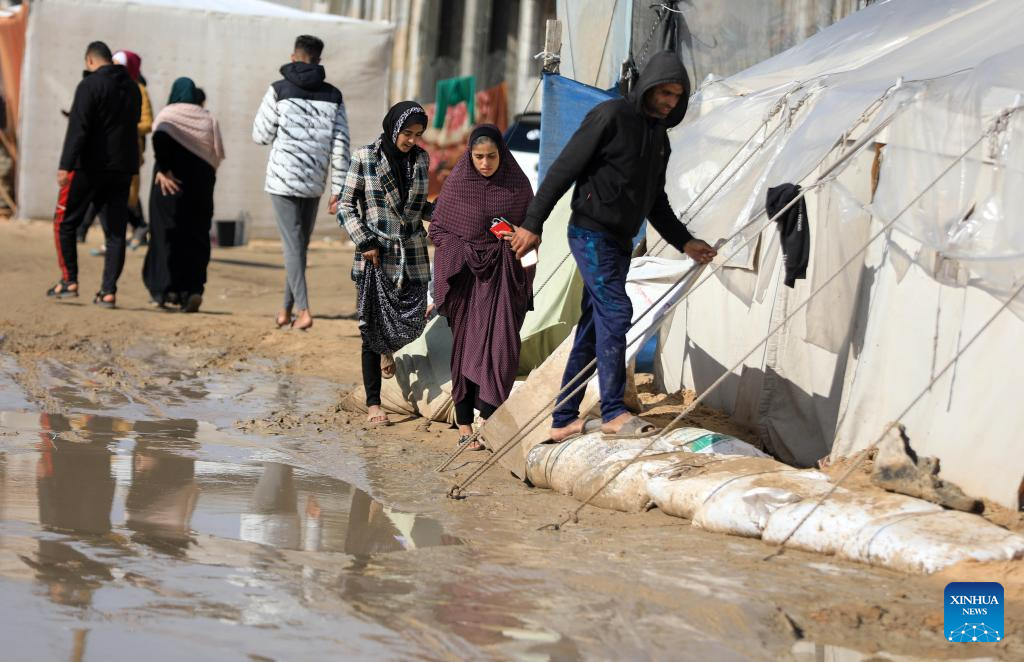
People are seen after rainfall at a temporary camp in the southern Gaza Strip city of Rafah, on Jan. 28, 2024. The United Nations Office for the Coordination of Humanitarian Affairs (OCHA) warned that tens of thousands of displaced people suffer from catastrophic conditions inside and outside shelters due to lack of food, water, shelter, medical care, and protection. "The absence of toilets increases the risk of the spread of disease," especially when rain causes floods, it warned. (Photo by Yasser Qudih/Xinhua)
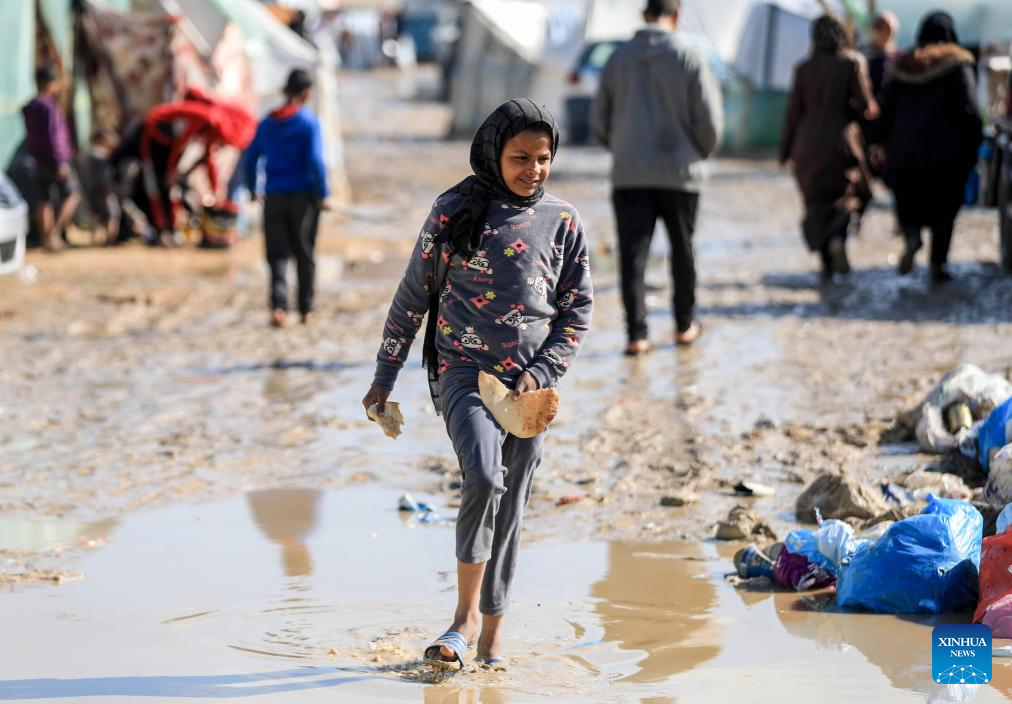
A girl walks through rainwater at a temporary camp in the southern Gaza Strip city of Rafah, on Jan. 28, 2024. The United Nations Office for the Coordination of Humanitarian Affairs (OCHA) warned that tens of thousands of displaced people suffer from catastrophic conditions inside and outside shelters due to lack of food, water, shelter, medical care, and protection. "The absence of toilets increases the risk of the spread of disease," especially when rain causes floods, it warned. (Photo by Yasser Qudih/Xinhua)
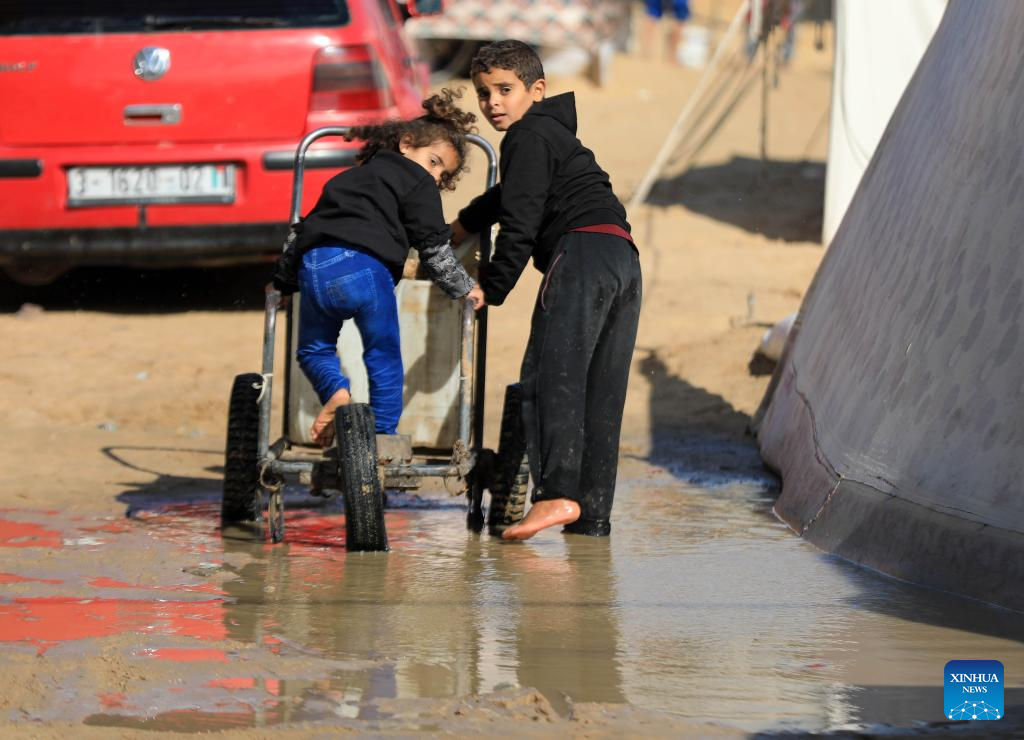
Children are seen after rainfall at a temporary camp in the southern Gaza Strip city of Rafah, on Jan. 28, 2024. The United Nations Office for the Coordination of Humanitarian Affairs (OCHA) warned that tens of thousands of displaced people suffer from catastrophic conditions inside and outside shelters due to lack of food, water, shelter, medical care, and protection. "The absence of toilets increases the risk of the spread of disease," especially when rain causes floods, it warned. (Photo by Yasser Qudih/Xinhua)
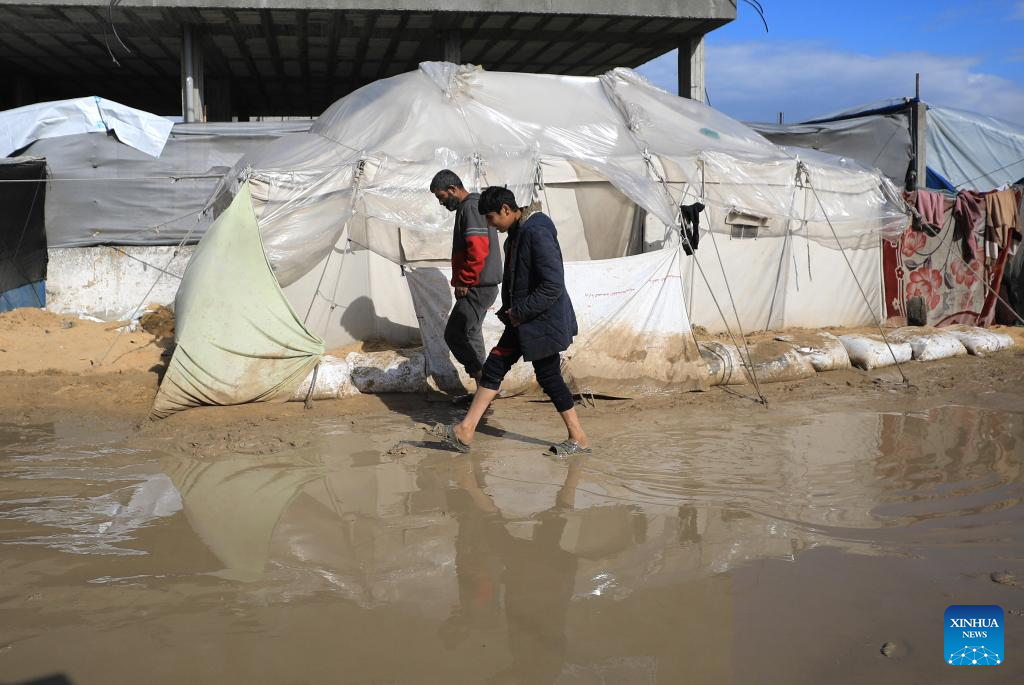
People walk through rainwater at a temporary camp in the southern Gaza Strip city of Rafah, on Jan. 28, 2024. The United Nations Office for the Coordination of Humanitarian Affairs (OCHA) warned that tens of thousands of displaced people suffer from catastrophic conditions inside and outside shelters due to lack of food, water, shelter, medical care, and protection. "The absence of toilets increases the risk of the spread of disease," especially when rain causes floods, it warned. (Photo by Yasser Qudih/Xinhua)



